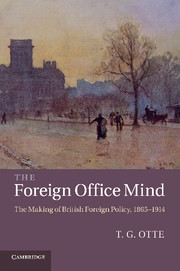Book contents
- Frontmatter
- Contents
- Illustrations (to be found between pages 146 and 147)
- Preface and acknowledgements
- List of abbreviations
- Introduction
- 1 Illusions of supremacy
- 2 The problems of isolation
- 3 Problems of consolidation
- 4 Two Eastern Questions
- 5 The transformation of Great Power politics
- 6 The end of an era
- Conclusion
- Select bibliography
- Index
- Plate section
- References
Conclusion
Published online by Cambridge University Press: 07 October 2011
- Frontmatter
- Contents
- Illustrations (to be found between pages 146 and 147)
- Preface and acknowledgements
- List of abbreviations
- Introduction
- 1 Illusions of supremacy
- 2 The problems of isolation
- 3 Problems of consolidation
- 4 Two Eastern Questions
- 5 The transformation of Great Power politics
- 6 The end of an era
- Conclusion
- Select bibliography
- Index
- Plate section
- References
Summary
‘There are, however, moments in which the resources of diplomacy have proved impotent …, and when the national honour has been engaged by aggression or defiance its task is obviously at an end.’
James Rennell RoddNearly one week into the war, on walking down King Charles Street on his way to the Office, Eyre Crowe
found a tiny sparrow hardly able to fly, crouching under the archway. I picked it up and carrying it down to the park, put it on a bush. It seemed a natural thing to do and I suppose I did it almost mechanically. Just then a battalion of infantry passed by, and the thought of saving that little sparrow whilst hundreds of thousands of men were marching to their deaths crossed the mind and caused a choke in the throat.
Few diplomats had any real conception of what lay ahead in August 1914. Armaments, the political uses of armed force, and the prospect of conflict had, of course, been the underlying themes of the internal debates that had shaped the ‘Foreign Office mind’ since the late 1860s. But the slaughter of the Somme was beyond their imagination. It was, indeed, the end of an era. The long nineteenth century had come to a violent end. And it was, perhaps, little wonder that even a seasoned diplomat like Sir Edward Goschen, Britain’s ambassador at Berlin, broke down in tears when that end came.
Even so, few senior officials and diplomats really understood the full implications of the conflict that had been unleashed. Their failure to anticipate the horrors of the carnage in Flanders fields should not be held against them. They were the products of their times and their class. Britain’s diplomats formed a small, self-contained and exclusive group, with a strong corporate spirit and ethos. It was a group recruited from a small section of society; and it reflected the strengths and weaknesses of Britain’s upper classes, their virtues as much as their failings. Studying the records they left behind cannot fail but to increase one’s respect for the diplomats of this period. They were not the Wooster-ish types that stride along the corridors of power in the pages of popular fiction or in certain forms of popular history. They were, on the contrary, able, conscientious and intelligent public servants: ‘The speed of response, the clarity of analysis and the attention to detail was indeed impressive.’ And they acted in the belief that their ‘supreme duty is … to the State’.
- Type
- Chapter
- Information
- The Foreign Office MindThe Making of British Foreign Policy, 1865–1914, pp. 393 - 408Publisher: Cambridge University PressPrint publication year: 2011



